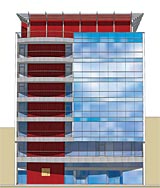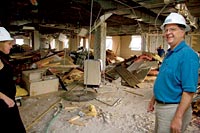An Asheville conservation group is confronting developers on their own turf—fighting money with money. Trying to draw attention to the city’s policy of selling the airspace over public rights of way, People Advocating for Real Conservancy has gotten into a bidding battle with a high-profile downtown developer.

It’s not that the group isn’t happy that developer Urban Capital is doing something with the First Union building, which has stood empty since 2003. “I think it’s wonderful that they are renovating that building,” says PARC’s Elaine Lite. “It’s really more the city that’s to blame.”

What Lite is blaming the city for is its policy of allowing balconies to protrude into the public right of way—in this case, over the sidewalk at 82 Patton Ave.—at what she says is too low a price.
Urban Capital, headed up in part by longtime downtown developer Chuck Tessier, is planning a $4.3 million renovation on the building. With a new design by John Rogers of Rogers/Chenevert Architects, it will be rechristened the Capital Center and house office condominiums and a ground-level restaurant.
Although the issue is relatively new to Asheville, city policy has been to price airspace at 20 percent of the value of the equivalent square footage on the ground. Developers then bid on the price, and typically, that is that.
Not so in the case of the First Union building. When Tessier matched the city’s appraisal of $3,350, PARC came forward with an upset bid of $3,567.50. In a corresponding press release, Lite said that balconies clutter Asheville’s downtown and lead to the loss of street trees.
“I just think they are too imposing for the size streets we have,” Lite told Xpress. Lite points to the condominium building at 21 Battery Park Ave., and its jutting balconies, as an example.
The price of the air up there
At 82 Patton, work is well under way, with crews gutting the entire building. Tessier says they will strip the interior down to the concrete before renovations begin. The proposed balconies, protruding about 3.5 feet past the property line, would be arc-shaped, bowing out from the front of the building. The balconies were added to make space next to an existing elevator shaft that runs up the front of the building. Currently, there are only a few feet between the shaft and the outside wall—space that will become the inner part of the balconies. There is already overhang above the front entrance on that side of the building, Tessier notes.

Last week, Urban Capital returned to the city with a bid of $3,800. Each time a bid is made, the city must advertise for upset bids for another 10 days. On May 28, Lite told Xpress that PARC plans to place another counter bid, probably by the end of the week, but that details on the amount of that bid were not nailed down yet.
Lite says she knows that developers with deep pockets, including Urban Capital, can beat her group in bidding wars, but PARC aims to draw attention to the city’s airspace policies. The city, she argues, was practically giving away the airspace at the price it was asking.
The going price of airspace caught the attention of City Council when the issue came up in April. Alongside Urban Capital, Kessler Asheville was also bidding on airspace for a development near the Biltmore Estate. Kessler matched the city’s appraisal of $11,665, and construction there is now underway.
But Council initially hesitated on the issue, asking staff to research how other cities handle similar situations. According to Asheville’s Real Estate Manager Ed Vess, cities such as Wilmington and Greenville grant encroachment agreements for balconies, asking only for a processing fee that can run as low as $250. Those agreements can be revoked, Vess adds. In the case of Greenville, an agreement expires in 40 years, with renewals issued every 10 years thereafter. On the other end of the spectrum are cities like Aspen, Colo., where such balconies are forbidden altogether.
In his report to Council, Vess promoted the policy of selling airspace, saying that it provides a permanent solution rather than one that has to be dealt with by later city councils. He argued that balconies provide more taxable property and noted that state law dictates how airspace over public rights of way is sold.
City Attorney Bob Oast, however, says there is some wiggle room in the policy because of the code’s wording. State law merely says that air rights will be treated as real property, but there are several ways the city can dispose of property, including upset bids, blind bids and auctions.
Growing up too fast?
As Asheville explores this relatively new territory, groups like PARC have taken note and are trying to gin up public concern over the loss of airspace in Asheville. Balconies block views and sunlight and turn streets into tunnels, they say, and developers use the public airspace to increase square footage on the cheap. In an essay posted on PARC’s Web site, spokesperson Julie Brandt chided the city for “providing corporate welfare” and “subsidizing private developers” at the expense of the public.
But the balcony issue is only part of a larger development picture, Lite says, one where Asheville is letting its downtown build up too fast.
“We are on the top-10 list every other week somewhere,” she says. “When are we going to get over this mentality? We can say ‘No.’” Lite would like to see the city declare a moratorium on development while it takes a look at what Asheville wants for its downtown.
Meanwhile, Tessier isn’t wild about being made an example. His proposed balconies do not jut out as far as the Haywood Park condominiums’ do, he says, and he notes that the development near Biltmore is moving along unhindered.
“We really don’t know why we are being singled out,” he says, stressing that no trees will be affected by the balconies. “Nobody had anticipated this being so controversial.” Five of the eight office floors have already sold, mostly to local businesses. That, he says, should attest to the desirability of the design. He further argues that Asheville’s purchase policy is stronger than cities that grant encroachment agreements. “In most towns, they give it away.”
Work won’t begin on the front of the building for another three months, but Tessier would like to see the balcony deal sealed quickly rather than let the controversy snowball and trigger some other consideration by Council. The Capital Center renovation is slated for completion in roughly a year.
Vess notes that any deal still has to be approved by city leaders. “Council has the prerogative to change their mind, I guess,” he says. And until that formal decision is made, the possibility of balconies on the old First Union building are, so to speak, up in the air.



Before you comment
The comments section is here to provide a platform for civil dialogue on the issues we face together as a local community. Xpress is committed to offering this platform for all voices, but when the tone of the discussion gets nasty or strays off topic, we believe many people choose not to participate. Xpress editors are determined to moderate comments to ensure a constructive interchange is maintained. All comments judged not to be in keeping with the spirit of civil discourse will be removed and repeat violators will be banned. See here for our terms of service. Thank you for being part of this effort to promote respectful discussion.